Open internet and inclusive technology
New digital technology and the internet brought with it a promise of equal access to knowledge, openness and connection. Their ubiquity has brought opportunity for progress. However, access to digital technology is vastly unevenly distributed. Technology, especially when relying on artificial intelligence, location and biometric data, can amplify social, racial and environmental injustices. We work to bring back the original purpose of an open internet and enable inclusive, sustainable technologies that work for all and for the greater good.
Filter resources
-
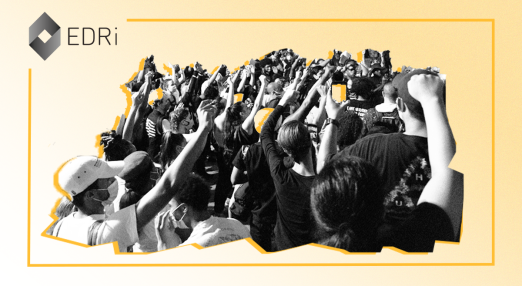
France must not betray European citizens on the DSA at the 11th hour
As civil society, we welcomed Minister Cedric O’s commitment on Friday to prohibit targeted advertising to minors as well as the use of sensitive data for ad targeting in the DSA. Now the French Council Presidency must follow through and protect citizens, 35 NGOs write in an open letter.
Read more
-

EDRi-gram, 23 March 2022
In this edition of the EDRi-gram, we look at the leaked opinion of the Commission which sets off alarm bells for mass surveillance of private communications. The newly-revealed opinion confirms the fears that EDRi and 39 other civil society groups recently raised about the proposal which could destroy the integrity of private online communications across the EU, and set a dangerous precedent for the world. We are also urging for real solutions to the flaws of the law guarding our data protection and privacy. Though a new record of high fines based on the GDPR was issued in 2021, people still face barriers to exercising rights like access to remedy and benefiting from a harmonised enforcement mechanism.
Read more
-
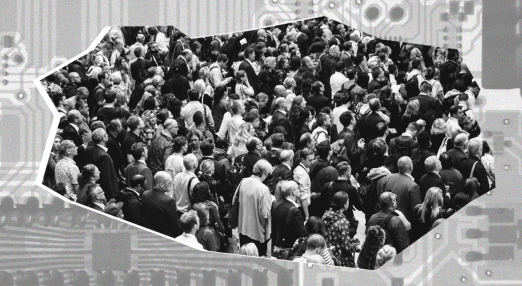
Promoting human rights in the digital era
Digital technologies are part of everyday life, but we don’t know much about how they impact our rights. A Czech-Norwegian project aims to change this.
Read more
-

Propaganda cannot be silenced with censorship, freedom of expression can
By order of all governments in the European Union, internet providers and platforms are blocking access to Russian state media. However, European governments would do better to stimulate the independent media in both Russia and Ukraine.
Read more
-

EDRi-gram, 9 March 2022
In this edition of the EDRi-gram, we voice the call of 72 civil society organisations to abolish manipulative dark patterns and creepy online ads. We are also urging the international community to provide the necessary support to Ukraine and its human rights defenders to ensure that people are protected from cyber threats.
Read more
-

The Online Safety Bill: punishing victims
The government has today announced two new regressive and unworkable additions to the Online Safety Bill. With each new announcement, the Bill demonstrates itself to make the online world less safe for the people it claims to protect, particularly LGBTQ+, survivors of abuse and ethnic minorities.
Read more
-

Music industry against Uberspace: Video downloads are not copyright infringements!
EDRi's member Gesellschaft für Freiheitsrechte fights against the music industry's attempts to put a digital lock on open source software, that enable media, human rights defenders, archivists and many others to access essential content.
Read more
-

French deputies must reject online censorship without a judge in one hour
On 9 February 2022, the Law Commission of the French National Assembly discussed the bill concerning the "dissemination of terrorist content online", transposing the European regulation on terrorist content online into French law. European Digital Rights (EDRi) and EDRi’s members La Quadrature du Net and Wikimedia France sent the following letter to the members of this Commission to call for the rejection of the bill prior to the discussion.
Read more
-

EDRi-gram, 16 February 2022
In this edition of the EDRi-gram, we put EDRi's affiliate ECNL in the spotlight to take a peek at the fights they are fighting to advance our freedoms online and offline. We're also looking at a comparison between the Western Balkans countries' digital advancement and what the digitalisation of all aspects of life mean citizens' well-being. We're also exploring the Belgian authority's decision that IAB Europe’s consent pop-ups are incompatible with the GDPR, which has been confirmed by 27 data protection authorities from 20 EU countries involved in the cross-border investigation.
Read more
-
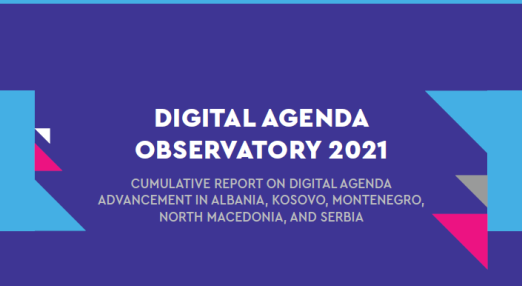
Digital Agenda’s report on digital advancement in the Western Balkans
Digitalisation in all spheres and for all social groups may be an effective mechanism for improving the well-being of citizens. This means improving the digital efficiency of institutions, organisations and other social entities.
Read more
-
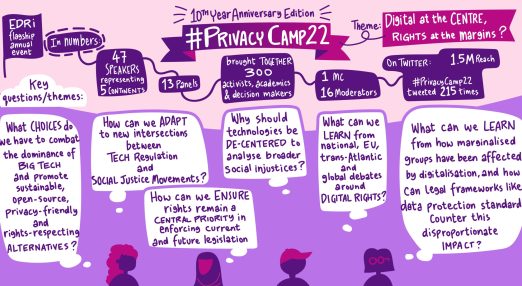
#PrivacyCamp22: Event Summary
The theme of the 10th-anniversary edition of Privacy Camp was "Digital at the centre, rights at the margins" and included thirteen sessions on a variety of topics. The event was attended by 300 people. If you missed the event or want a reminder of what happened in a session, find the session summaries and video recordings below.
Read more
-
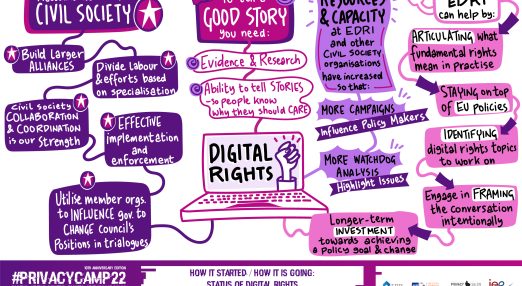
How it started, how it’s going: Halfway through the current European Commission’s legislative term
In January 2022, EDRi held a panel at its annual flagship event Privacy Camp to discuss the EU’s current legislative term and what to expect by the next EU elections in terms of digital rights.
Read more
